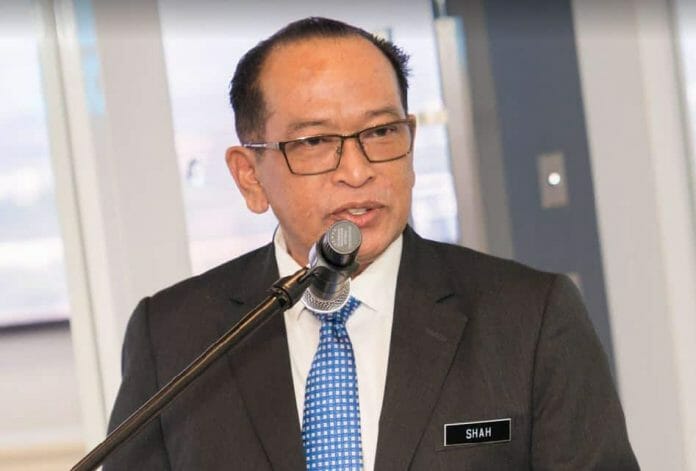The National Cyber Security Agency (NACSA) believes that cybersecurity is a shared responsibility which is why it’s high on Malaysia’s national agenda.
Its CEO Ir. Mohd Shah Nuri Bin Md. Zain (pic) said that, with economies worldwide veering towards broad usage of digital technologies, cybersecurity has emerged as one of the main national challenges for all governments worldwide.
“This is because the high dependency on digital technology that relies on the cyber environment exposes proponent to other unintended consequences as it opens up new vulnerabilities in this domain. We have seen the increasing number of incidences of abuse and threats from organised crime involving drugs and human trafficking, financial fraud and money laundering. The cyber platform is a quick and efficient medium for them to plot and conspire in their criminal activities,” said Shah.
As a result, Shah believes that close engagement and cooperation among multi-stakeholders by government, industry, academia and civil society are crucial to dealing with cyber threats.
“Such collaboration will facilitate innovation by effectively combining resources, knowledge and competencies,” he said.
“To ensure a concerted and coordinated national cybersecurity management in mitigating the emerging cyber security challenges, Malaysia will be introducing national cyber security strategy that will serve as 5 years’ Malaysia’s plan in addressing cyber security, encompassing multi-stakeholders from public and private sectors in Malaysia,” he added. “This strategy will be realised through the mobilisation of human resource and the development of infrastructures which will focus on the creation of the National Cyber Security Workforce to ensure the optimal utilisation of existing resources and expertise.”
Shah’s aim is for closer public-private sector collaboration to promote understanding of cybersecurity risks, encourage a more informed risk management decisions, and advocate investments in appropriate security measures.
“These would include investing in quality and established security certification programme supported by advanced labs to conduct compliance tests and test-bedding as some of the necessary steps to embed cyber hygiene practises that aim towards technology and infrastructure resiliency,” said Shah.
The NACSA CEO was speaking at the launch of TÜV AUSTRIA Cybersecurity Lab Sdn Bhd, an Austrian-Malaysian joint-venture between TÜV TRUST IT, a member of the TÜV AUSTRIA Group, and LGMS of Malaysia.
TÜV AUSTRIA is an international testing, inspection and certification (TIC) company with more than 2,000 staff delivering expert services in more than 20 countries worldwide. Founded and based in Austria, the TÜV AUSTRIA Group generates some €220m (RM1 billion) in annual revenue today.
Malaysia’s LGMS is one of the region’s leading end-to-end cybersecurity firms with renowned brands courting its expertise. The company has been accredited with multiple international certifications and recognitions, including International Data Corporation (IDC), which recognised LGMS as one of the world’s leading IoT (internet-of-things) key penetration testing vendors in a 2019 IDC report.
Under the partnership, TÜV AUSTRIA Cybersecurity Lab Sdn Bhd will house a global Cybersecurity Testing and Certification Center of Excellence (CoE) to serve both domestic and international markets.
“TÜV AUSTRIA Cybersecurity Lab will go a long way in solidifying Malaysia as Asia‘s foremost authority in cybersecurity assessment, testing, and certification,” said LGMS group managing director Fong Choong-Fook.
He explained that TÜV AUSTRIA Cybersecurity Lab would be instrumental in helping organisations identify vulnerabilities within their IT infrastructure before recommending measures to maintain and to constantly improve on their security levels.
“At the same time, our JV will also stimulate the Industry 4.0 Cyber Security Testing & Certifications ecosystem while driving the protection of Critical National Infrastructure (CNI),” Fong added.
Meanwhile, TÜV AUSTRIA Group CEO Dr Stefan Haas considers establishing a cybersecurity CoE jointly with LGMS as one of the most auspicious developments in its company’s history.
“We offer certifications based on international and TÜV proprietary standards that document the efficiency and security of customer demands,” he further said, adding that organisations can profit from the well-known brand TÜV and gain a competitive advantage with the TÜV seal.
In Shah’s view, this partnership between the TÜV AUSTRIA Group and LGMS would position Malaysia as the hub for testing, inspection and certification at the Asia-Pacific.
“With such strong name in TÜV AUSTRIA, LGMS is set to complement and further advance our national agenda in stimulating our local cybersecurity industry in serving domestic and international markets,” said Shah, adding that he believes hundreds of new highly skilled cybersecurity jobs from this joint-venture will provide the right talent and address the talent gap issue that the country is currently facing.
“I would like emphasise that the cybersecurity industry development is a collaborative effort. We remain focused on enabling a sustainable digital economy: one that is built on a vibrant domestic ICT ecosystem with the goal of transformative adoption of digital solutions by government, businesses and the rakyat,” concluded the NACSA CEO.
Attachments area









